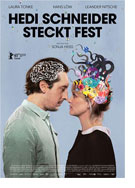

Opening 7 May 2015
Directed by:
Sonja Heiss
Writing credits:
Sonja Heiss
Principal actors:
Laura Tonke, Hans Löw, Leander Nitsche, Jakob Bieber, Àlex Brendemühl
Hedi Schneider (Laura Tonke) is a quirky and funny mother, wife, and colleague. She has a loving husband (Hans Löw) and young son (Leander Nitsche), and they are planning to go to move to Africa in a few weeks to work in humanitarian aid. When one day she goes to work and finds out her cubical neighbor has tried to commit suicide, she begins to get panic attacks which eventually lead to a crippling depression and fear of leaving the house. As she and her husband struggle with this illness, her world slowly falls apart around her.
No matter how good things are going, there is always a chance that everything can change. Everyone in Hedi’s life seems taken aback that she would be the one to struggle with mental illness. Her mother states openly to her, “I never thought you would be the one to get something like this.” Her husband Uli struggles with the changes and despite trying to help initially, eventually becomes resentful when things don’t go his way. The overwhelming sense that comes from this film is that people who come down with a mental illness in Germany are facing not only a lack of support from specialists, but also from their loved ones.
There are several eye-opening moments in the film which are played for laughs, but are rather indicative of a broken system. When she goes to a psychiatrist at the beginning of her illness to find help for her panic attacks, she is given a tranquilizer which she immediately misuses in front of the doctor. However, instead of the doctor seeing this as a sign of potential substance abuse, she simply turns to Uli and tells him that he needs to keep a closer eye on her. That was the extent of help that she receives there. Later, when their trip to Africa is at risk, instead of telling the case worker that Hedi is sick with depression, Uli feels compelled to say she has cancer instead. Whether this is due to his shame of having a wife with a mental illness or his knowledge that the case worker would take this as a reason to not allow them to continue to Africa because of his biases, is not explained. But regardless it is a shameful secret that follows them. Later, when Hedi returns to work, it is revealed that her boss has informed the office of her illness. This is also presented as comical, but is in fact tragic in the way that her personal health has been revealed to strangers who now treat her differently because of it.
When this is all put together it becomes clear that support for someone suffering a mental illness in Germany is farcical, but it does not seem to be the reasoning behind why the director Sonja Heiss chose to make it a dark comedy. Instead it seems the focus is supposed to be more on the relationship of the leads, which at first seems strong, but then begins to tumble out of control. However, for anyone who has ever faced mental illness and felt trapped by it, the tragic treatment of Hedi does not elicit laughs, but rather tears, as one begins to wonder how many people in similar circumstances are suffering throughout the country. (Rose Finlay)